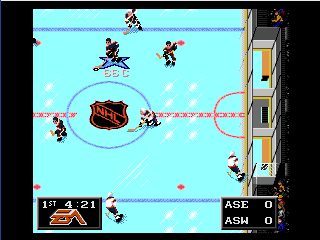NHL Hockey, also known as EA Hockey in Europe, was released in 1991 for the SEGA Mega Drive and marked the beginning of the EA NHL series. It would become one of the most iconic sports game franchises of all time. Developed and published by Electronic Arts, the game is often credited with revolutionizing the presentation of hockey in video games, blending arcade speed with simulation depth in a way that made it both accessible and addictive.
At the time of its release, hockey games on computers and consoles were generally slow, clunky, and often lacked the excitement of the real sport. Titles like Wayne Gretzky Hockey on MS-DOS offered decent strategic depth but suffered from stiff controls and limited animations. On the Amiga, games like Face-Off were no better. Titles like Ice Hockey for the NES or Hit the Ice for the SNES leaned heavily into arcade comedy and lacked realism.
NHL Hockey on the Genesis/Mega Drive, by contrast, introduced a fast, fluid, and responsive style of play. The top-down view of the rink allowed for better strategic awareness and easier puck control. The game featured full team rosters from the 1991 NHL season (in the North American version), real player stats, and digitized speech effects that added to the atmosphere. Although it lacked official NHL team names and logos outside North America, the authenticity was already a major leap forward.
The gameplay stood out due to its intuitive controls, physical checking system, and strategic AI. Passing, shooting, and body-checking felt smooth and natural. Penalties, injuries, and line changes were included, providing a layer of realism uncommon in console sports games of the era. The pace was quick but never chaotic, and the matches could turn in seconds, creating an engaging and competitive experience whether playing solo or against a friend.
Visually, NHL Hockey used sharp sprites, a clean interface, and animation that captured the energy of real hockey. The sound design, with the crunch of body checks and the crowd's reactions, further enhanced the immersion.
The game's success helped establish EA’s dominance in the sports genre and laid the foundation for the long-running NHL series, which continued with NHLPA Hockey 93 and NHL Hockey 94 for Genesis and SNES, while NHL 95 was also released for PC. NHL 96 was instead, again, a console exclusive.
NHL Hockey was a turning point not only for hockey games but for sports simulations in general. It struck the perfect balance between realism and fun, and its influence is still felt in the genre today.














